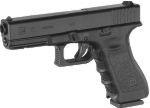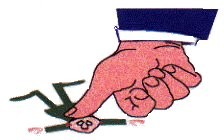Fri, May 09, 2003
'Like, What Do We Do With The Guns?'
Now that our nation's 44 (four of the original class of 48
flunked out, for reasons we're not allowed to know) licensed FFDOs
(Federal Flight Deck Officers) have flown nearly 300 shooting-free
flights since their matriculation, some members of the House think
it's time for some feedback. The next class is set to start in
July, and it would be nice, they figure, if any problems get
addressed before then.
 In the House Transportation Aviation Subcommittee
Thursday, several pilots brought their ideas forward. The
proceedings haven't been published, but a laundry list of potential
topics included a few that should have been thought of,
earlier.
In the House Transportation Aviation Subcommittee
Thursday, several pilots brought their ideas forward. The
proceedings haven't been published, but a laundry list of potential
topics included a few that should have been thought of,
earlier.
- The federally-owned and -issued handguns must be carried in a
separate lockbox, to be opened only in the cabin. Pilots are
worried that the sheer size of the lockboxes makes their status as
FFDOs obvious.
- Cargo pilots can't be FFDOs; they'd like to be, and they often
carry sensitive cargo; and they often don't have the same screening
and backup at their airports that's available with PAX.
- When the FFDOs are off-duty, or deadheading, the TSA requires
their weapons to be carried in the cargo compartment of the
airplane. That dramatically increases the probability that the guns
will be stolen (ask UPS and FedEx); it also prevents these valuable
and expensive specialists (FFDOs) from being useful, in the event
that their hard-won services are needed.
- The TSA simply doesn't trust pilots. The House poop sheet on
the hearings says, "The Arming Pilots Against Terrorism Act allows
the TSA to conduct psychological testing of FFDO candidates to
ensure that they are fit for duty. There is concern among pilots
that the tests are excessive and designed to fail a large number of
candidates."
- There aren't enough of the TSA's pet training facilities to
accommodate all the pilots who need to use them. Although that
bottleneck has been long-recognized, the TSA claims that only their
pet facilities are up to the task; the hundreds of
otherwise-qualified facilities, where law enforcement (including
state and federal officers) are trained, are just not good enough
-- or perhaps they're too plentiful.
- FFDOs operate on domestic flights only. The TSA apparently
believes that terrorists won't strike on international
flights.
 There were to have been two panels, the first of
which was set up to be monopolized by just one man, Mr.
Stephen McHale, the TSA's Deputy Administrator. The second panel's
slated witnesses are Captain Duane Woerth, the President of Airline
Pilots Association, International; Dan Graves, Secretary-Treasurer,
Local 1224, International Brotherhood of Teamsters; Steve Alterman,
the President of the Cargo Airline Association; and Owen "Buzz"
Mills, who is the President and Chief Executive Officer of one of
the nation's premier private training facilities, Gunsite Academy,
Inc., of Paulden (AZ).
There were to have been two panels, the first of
which was set up to be monopolized by just one man, Mr.
Stephen McHale, the TSA's Deputy Administrator. The second panel's
slated witnesses are Captain Duane Woerth, the President of Airline
Pilots Association, International; Dan Graves, Secretary-Treasurer,
Local 1224, International Brotherhood of Teamsters; Steve Alterman,
the President of the Cargo Airline Association; and Owen "Buzz"
Mills, who is the President and Chief Executive Officer of one of
the nation's premier private training facilities, Gunsite Academy,
Inc., of Paulden (AZ).
We wish them good luck.
More News
From 2023 (YouTube Edition): "Ain’t Your Daddy’s Super Cub”—Don Wade Co-owned by Don and Ron Wade—the former of Don’s Dream Machines, a storied >[...]
Pilot-Rated Passenger Reported That The Pilot Did Not Adequately “Round Out” The Landing Flare And The Airplane Bounced And Yawed To The Right Analysis: The pilot state>[...]
Dead Reckoning Dead reckoning, as applied to flying, is the navigation of an airplane solely by means of computations based on airspeed, course, heading, wind direction, and speed,>[...]
Aero Linx: Lake Amphibian Club This website is created and sponsored by the Lake Amphibian Club, to help spread the word about these wonderful, versatile amphibians that can land j>[...]
“I am deeply honored to be sworn in as NASA administrator. NASA’s mission is as imperative and urgent as ever — to push the boundaries of human exploration, ignit>[...]
 Classic Aero-TV: In Praise of Alabamas Patriot Aircraft USA
Classic Aero-TV: In Praise of Alabamas Patriot Aircraft USA NTSB Final Report: Cirrus Design Corp SR22
NTSB Final Report: Cirrus Design Corp SR22 ANN's Daily Aero-Term (12.21.25): Dead Reckoning
ANN's Daily Aero-Term (12.21.25): Dead Reckoning ANN's Daily Aero-Linx (12.21.25)
ANN's Daily Aero-Linx (12.21.25) Aero-News: Quote of the Day (12.21.25)
Aero-News: Quote of the Day (12.21.25)




